CR&DALL was delighted to host a seminar in honour of Emerita Professor Lalage Bown on 23 May 2018 in the School of Education at the University of Glasgow to mark her continuing commitment to adult education and international development in her 10th decade. The seminar was opened by Professor Anne Anderson, Vice-Principal and Head of the College of Social Sciences who in her remarks, emphasised how much she in the early stages of her own career had been influenced by Professor Bown’s commitment to gender equality. This issue was picked up later by Barbara Read in her presentation of work being undertaken with African partners as part of a Global Challenges Research Fund (GCRF) project concerned with gender in Higher Education. As many CR&DALL subscribers will know, Lalage worked for many years in Ghana, Nigeria and Zambia, becoming the first female professor of adult education in the Commonwealth before later assuming the same status when appointed to the University of Glasgow. In my opening presentation, I tried to give some sense of Lalage’s career and life trajectory. Although I knew that she had been a contemporary of Margaret Thatcher at Somerville College, Oxford, I did not know (and she reminded the audience) that they were respectively chairs of the Conservative and Socialist societies there: a formidable combination.
Our opening speakers were charged with scene-setting, Tom Schuller, Michele Schweisfurth and Jim Gallacher reminded us of the progress made in Scotland (and more widely) in adult and lifelong learning, and in international development. I had envisaged that Tom would at least provide one surprising thought, and he did not let us down with his proposal as one of five priorities for the field being a focus for adult education in preparation for death.
Latter presentations focused on current work of the School of Education and the centre for Open Studies with input not only from Barbara Read, but also Catherine Lido (Big Data and older adult learning), Alec Mackinnon (Access to Higher Education), Queralt Capsada-Munesch (Young Adult Lifelong Learning in Europe) and Bonnie Slade (the International Masters in Adult Education for Social Change (IMAESC)). Bonnie’s input was completed by three highly impressive reflections by IMAESC students Tracy Dolcy (from St Lucia), Daniel Akor (from Ghana) and Preeti Kaur (from India). The field of adult education is safe in such hands. These presentations overall provided just a taste of the work that we do in research and teaching, and demonstrate both that we have sustained the legacy that Lalage (and her successors have laid down), but also the ways in which we have been able to develop work in new directions. Lalage’s immediate successor, Professor Maria Slowey, although unable to be with us, was able to send to us an eloquent appraisal of her memories of Lalage in a video presented to participants.
The final session allowed first Professor Alan Rogers and then Professor Michael Omolewa to offer their perspectives. Alan in a passionate presentation argued that the focus of adult education provision should ‘move away from lifelong learning to the more socially transformative provision which forms the basis of the SDGs –addressing the key issue of inequality’, and argued for an approach based on the creation of a national system of community learning centres. Michael, who had travelled from Nigeria especially for this event, fondly remembered that that it was Lalage who had been responsible for offering him his first lectureship at the University of Ibadan even though he claimed (erroneously I suspect) that this had occurred despite the fact that he knew nothing about the subject.
Of course other participants at the seminar made many contributions from the floor, but we gave the last words to Lalage. I will leave readers to assess what she had to say through playing the video below. Suffice it to say that as ever she provided a fitting end to the seminar, and we wish her well for her next decade of contributions:
Just to cap things off, she spent much of the afternoon offering advice to a visiting PhD student from the University of Derby!!
Some photos and presentations are featured below.
I wish to thank everyone for their efforts in contributing to this event, especially colleagues Margaret Sutherland and Susan Kelly without whose logistical and practical support we could not have done so.
Sports Shoes | New Balance 991 Footwear
Gallery images (click to enlarge):
Discussion topics:
- Log in to post comments


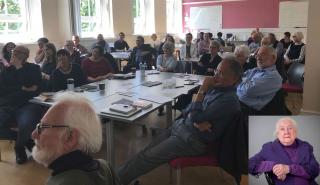
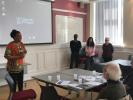


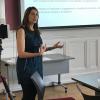



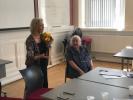

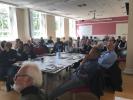











Comments
A Poem for Lalage from Budd Hall
Drum Beats of Learning: For Lalage
Imagine yourself on a warm West African evening
Live horns and saxophones of Nigerian hi life pulsating
Cold green bottles of Star beer set out
Mostly young men, some from the army, some traders some journalists
This is the ‘midnight seminar’ of the University of Ibadan’s
Extra-mural studies Department
And opening up the late evening conversation about philosophy, politics and science
Is our young Extra-Mural Tutor, Lalage Bown
Cheltenham College and Oxford University is where this part of her story begins
Not the place one usually thinks of for an African story
But Lalage, having studied during the Second World War at Oxford,
Met Thomas Hodgkin, historian and former WEA teacher and then Head of the Oxford Extra-mural Delegacy
The Oxford Extra-Mural Delegacy was created at the end of the war to create adult education opportunities for post-war Africans and others to gain the skills needed for the new age emerging.
What Hodgkin really had in mind was the creation of a learning foundation to feed and support the independence movements in post-war Africa.
We are not sure how the conversations might have gone,
But the radical ideas of Thomas Hodgkin and the
Intellectual imagination of his partner Dorothy Hodgkin,
(Yes that Dorothy Hodgkin who was awarded a Nobel Prize)
Must have been exhilarating
In any case in 1949, at 23, she was selected as the only woman to join the newly created University of Ghana as a resident tutor
She was taken to the village where she was to help build her first cottage and to begin offering adult education classes
Classes that would add intellectual heat to the growing fires of the independence.
And so began a remarkable life of leadership and institutional development
In adult education and higher education as she worked and led Extra-Mural and Adult Education Departments in Ibadan, Nigeria, Kampala, Uganda, Lusaka, Zambia, Lagos, Nigeria and Zaria, Nigeria
Serving as the Secretary of the African Adult Education Association
Lalage’s contributions to adult education, intellectual and even political life during her years in Africa are hard to capture
She brought dignity, respectability, professionalism, and a passion for learning and justice
To each post, each book, each article, each speech and each conversation about adult education that she was involved in
She served each university that she worked in with a firm belief that that particular university
At that particular point in history was as good as any in the world
And she served the leaders, the students and the citizens of each of the places where she worked with full respect, focus and dedication
Much is known about Lalage Bown, her legendary achievements as a woman academic leader
Working in the decidedly patriarchal world of 20thCentury African education and politics
But what we also need to celebrate is her compassion and love
For her adopted Nigerian daughters
For her legions of friends in every corner of this vibrant world
For the music and culture of all parts of the African continent
And for wonderful late night conversations with an occasional glass of whiskey
In closing let us say thank you in the five of the languages of the countries where she worked
Budd L Hall
April 23, 2018